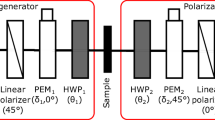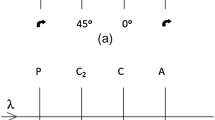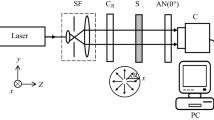Abstract
The retardation of two quarter-wave plates designed for a particular wavelength decreases or increases in accordance with the wavelength of input light beam. Compensating the shifted retardation at each measurement wavelength allows us to get Mueller matrices of samples at different wavelengths without exchanging the plates. Initial orientation errors of two plates and an analyzer, which remain constant through all wavelengths, are also taken into consideration. The availability and accuracy of this polarimeter is assessed by measurement of a quarter-wave plate designed for 632.8 nm wavelength. The results show that this system is very attractive to measure optical properties and dispersion in samples.
Similar content being viewed by others
References
R. M. A. Azzam: Opt. Lett. 2 (1978) 148.
P. S. Hauge: J. Opt. Soc. Am. 68 (1978) 1519.
D. H. Goldstein and R. A. Chipman: J. Opt. Soc. Am. A 7 (1990) 693.
D. H. Goldstein: Appl. Opt. 31 (1992) 6676.
L. Jin, N. Hamada, Y. Otani and N. Umeda: Opt. Eng. 43 (2004) 181.
Author information
Authors and Affiliations
Rights and permissions
About this article
Cite this article
Jin, L., Takizawa, K., Otani, Y. et al. Multi-Wavelength Mueller Matrix Polarimeter. OPT REV 12, 281–286 (2005). https://doi.org/10.1007/s10043-005-0281-x
Received:
Accepted:
Issue Date:
DOI: https://doi.org/10.1007/s10043-005-0281-x




